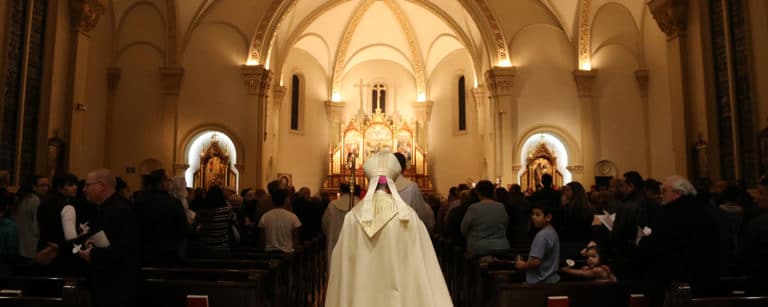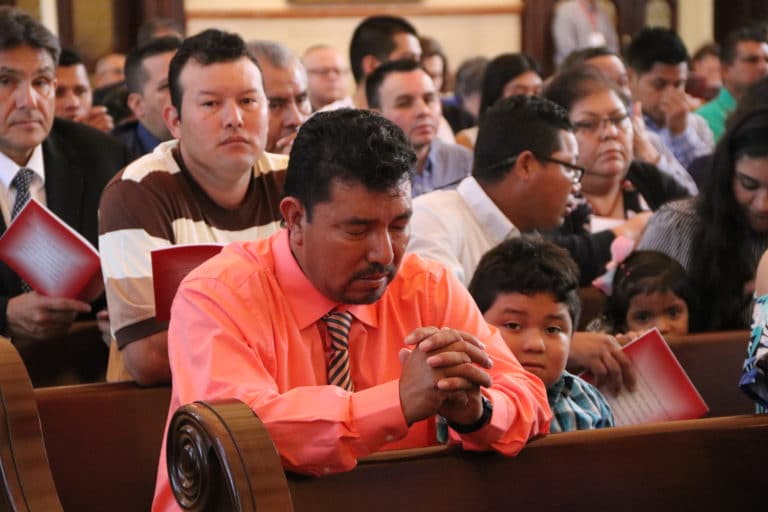
BY ELIZABETH WONG BARNSTEAD, THE WESTERN KENTUCKY CATHOLIC
Bishop William F. Medley has always liked the quote from Pope St. John Paul II that “Freedom consists not in doing what we like, but in having the right to do what we ought.”
This sentence, which was said by the pope in a homily at Camden Yards in Baltimore, Maryland on October 8, 1995, provided a foundation for Bishop Medley’s first pastoral letter, which he released on Nov. 20, 2020.
His letter, “I Will Go to the Altar of God,” was presented to emphasize the centrality of the Holy Eucharist for all Catholics – and that centrality being portrayed in the Church’s law that obligates participation in the Mass on Sundays and holy days.
The letter was printed in both English and in Spanish, and mailed to the home of every registered parishioner within the diocese in November 2020.
Suspending the obligation
Bishop Medley told The Western Kentucky Catholic on Nov. 4, 2020, that when public Masses were suspended back in March 2020 – at the start of the pandemic in the United States – he thought they would certainly be back by Easter, if not during Holy Week.
In fact, when he first announced the suspension, he had said this would be reviewed on Palm Sunday.
But by that point, as cases of infection rose, “that wasn’t possible,” said the bishop.
Bishop Medley said he understood when people reacted strongly to the public Mass suspension, noting their “hunger for the Eucharist.”
He heard from pastors whose people were begging Masses to reopen, and at the time he thought “you know, this could really be a revitalization of faith and practice – that when people who regularly attend are denied that, they’re going to want to come back. And maybe even people who were somewhat irregular, not having the option, maybe they’ll come back with new vigor.”
When on May 20 the suspension of public Masses was finally lifted after nearly 10 weeks, Bishop Medley said it broke his heart that the liturgy could not be celebrated as it had been before.
Masks were required. Pews were marked for social distancing, and singing was discouraged, among the multiple restrictions placed on the celebration.
Back in March, Bishop Medley had – like most bishops in the United States – put into place a dispensation from the obligation to attend Mass on Sundays and Holy Days of Obligation. This dispensation was enacted in order to protect the vulnerable and to hopefully curb the spread of the coronavirus across the region.
Even when public liturgies were permitted again, the bishop continued the dispensation to protect the vulnerable.
“It was in the weeks after that, that I began to think, we form habits rather easily,” said Bishop Medley. “And the habit of not worshiping, the habit of a family not coming to church, or even an individual, can get embedded pretty quickly.”
The bishop became more concerned after conversing with pastors and learning that they were seeing between 40-60% of their regular pre-pandemic crowd.
Bishop Medley admitted that they couldn’t have accommodated everyone within the ordinary worship space even if they did all return (some parishes have overflow options in basements or parish halls).
But even then, he worried that unhealthy habits were forming, especially among those who already questioned the reason for attending Mass on Sundays.

Celebrating the Eucharist as a community
Bishop Medley said the “kernel” of his pastoral letter started to develop over the summer. His original plan was to release the letter when they were ready and able to have everyone back at Mass, and when he was ready to lift the dispensation from the obligation; however, he was unsure how to even begin the letter.
His answer arrived at the end of the summer, when Cardinal Robert Sarah, the Prefect of the Congregation for Divine Worship and the Sacraments, released a letter to all national bishops’ conferences across the world titled “Let us return to the Eucharist with joy!”
The cardinal’s letter was written on the Solemnity of the Assumption of the Blessed Virgin Mary, August 15, 2020 and was approved and ordered published by Pope Francis on September 3, 2020.
In it, he addressed the very topic Bishop Medley had been reflecting upon – why the celebration of the Eucharist as a community is central to the Catholic faith.
“It’s like I called him and asked him and he wrote this for me!” chuckled Bishop Medley. He proceeded to draw much of his inspiration from the cardinal’s letter, and cites it frequently throughout his own.
Today’s reality
When Bishop Medley started writing his letter in September, the COVID-19 “curve” was flattening, and he thought he would release the letter when the dispensation was lifted from the obligation.
But then, infection rates began to spike again.
“I finally had to admit to myself that these (restrictions) like masks and distancing could well go on deep into 2021… and how could we re-impose the obligation if we in fact can’t accommodate the people?” he said.
“I don’t want that obligation to be something that makes people feel guilty,” said the bishop, expressing concern for those who cannot attend Mass right now due to health risks.
Bishop Medley said he wanted emphasize that he was speaking to the people, “heart-to-heart, about what the Eucharist is and why we ought to long for it.”
He simply hopes his letter will explain the importance of worshiping as a community, and that people who have gotten into a habit of not coming to Mass regularly might “rethink that” after reading his pastoral letter.
The bishop said he has never before written a pastoral letter because “I’m not a scholastic type,” but “then I began to think, a pastoral letter is ‘pastoral.’ You don’t have to be a theologian to write a pastoral letter.”
“And so I wrote it out of pastoral concern,” he said.
Read Bishop Medley’s first pastoral letter, “I Will Go to the Altar of God” online at owensborodiocese.org/pastoral-letter.
Originally printed in the December 2020 issue of The Western Kentucky Catholic.
Copyright © 2020 Diocese of Owensboro/The Western Kentucky Catholic
